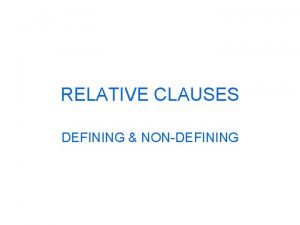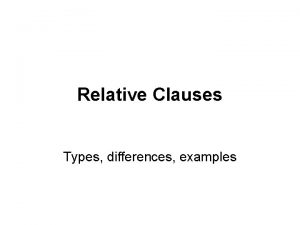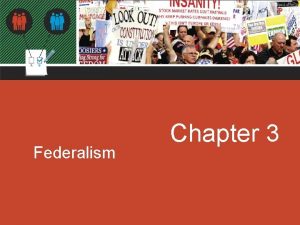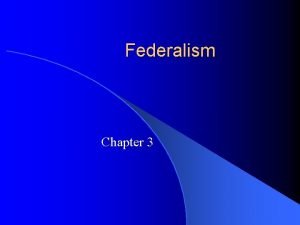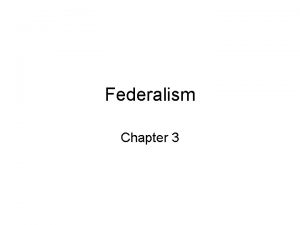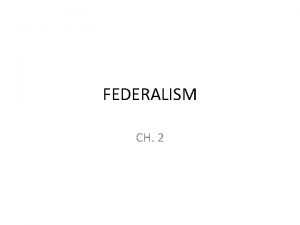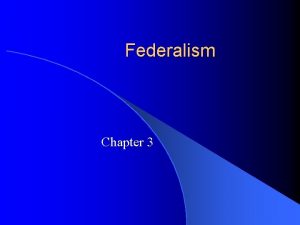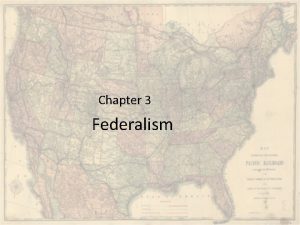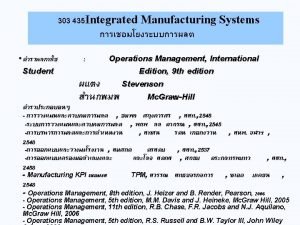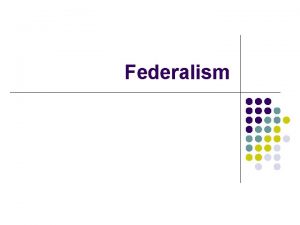Defining Federalism What Is Federalism Federalism Organizing a
















- Slides: 16

Defining Federalism • What Is Federalism? • Federalism – Organizing a nation so that two or more levels of government have formal authority over the same land people; the division of power between the national government and state governments

The Constitutional Basis of Federalism • The Division of Power • Supremacy Clause – Article VI of the Constitution states the U. S. Constitution, laws of Congress, and treaties are supreme. • Tenth Amendment – “The powers not delegated to the U. S. by the Constitution, nor prohibited by it to the states, are reserved to the states respectively, or to the people. ”


The Constitutional Basis of Federalism • Establishing National Supremacy • Implied Powers - Mc. Culloch v. Maryland (1819) ruled Congress had implied powers in addition to its enumerated powers; a state cannot tax a bank of the United States (federal gov. has implied power to create a bank) • Commerce Power - Gibbons v. Ogden (1824) defined commerce very broadly to encompass virtually every form of commercial activity.

The Constitutional Basis of Federalism • Establishing National Supremacy (cont. ) • The Civil War – Militarily the national government asserts its power over the Southern states’ claim of sovereignty. • The Struggle for Racial Equality – Brown v. Board of Education (1954) outlawed segregation in the public schools.


The Constitutional Basis of Federalism • States’ Obligations to Each Other • Full Faith and Credit – Article IV, Section I of Constitution requires each state to recognize the public acts, records, and judicial proceedings of all other states.

The Constitutional Basis of Federalism • States’ Obligations to Each Other (cont. ) • Extradition - Article IV, Section II of Constitution requires a state to surrender a person charged with a crime to the state in which the crime is alleged to have been committed.

The Constitutional Basis of Federalism • States’ Obligations to Each Other (cont. ) • Privileges and Immunities – Article IV, Section II of Constitution requires states to give citizens of each state the privileges of citizens of other states.

Intergovernmental Relations Today • From Dual to Cooperative Federalism • Dual Federalism – A system of government in which both the states and the national government remain supreme within their own spheres, each responsible for some policies.

Intergovernmental Relations Today • From Dual to Cooperative Federalism (cont. ) • Cooperative Federalism – A system of government in which powers and policy assignments are shared between states and the national government. • Standard operating procedures of cooperative federalism - Shared costs, federal guidelines, and shared administration.

Intergovernmental Relations Today • Devolution – Transferring responsibility for policies from the federal government to state and local governments. • State and local governments are mostly responsible for handling crime, welfare, and education.

Intergovernmental Relations Today • Fiscal Federalism – Pattern of spending, taxing, and providing grants in the federal system. • Federal grants to state and local governments have grown rapidly and now amount to more than $600 billion per year. • Grants increased in 2010 and due to the stimulus package.

Intergovernmental Relations Today • Fiscal Federalism (cont. ) • The Grant System: Distributing the Federal Pie ($600 billion) • Categorical grants (project grants and formula grants) can be used for specific purposes and have strings attached. • Block grants support programs in community development and social services; have few restrictions attachedgive states greatest flexibility


Intergovernmental Relations Today • Fiscal Federalism (cont. ) • Scramble for Federal Dollars – Grant distribution ($600 billion yearly) is universalism; a little something for everybody. • Mandates - Mandates direct state governments to comply with federal rules under threat of penalties or as a condition of receipt of a federal grant
 Relative clauses defining and non defining
Relative clauses defining and non defining Nonessential relative clause
Nonessential relative clause Defining and non defining relative clauses
Defining and non defining relative clauses Defining and non defining relative clauses in telugu
Defining and non defining relative clauses in telugu Tipos de relative clauses
Tipos de relative clauses Relative clauses örnekleri
Relative clauses örnekleri Professional nursing practice concepts and perspectives
Professional nursing practice concepts and perspectives Defining stoichiometry
Defining stoichiometry 4 key characteristics of chordates
4 key characteristics of chordates Connective relative clauses
Connective relative clauses Defining risk management
Defining risk management Result approach in measuring performance
Result approach in measuring performance Expand by giving an example
Expand by giving an example Defining globalization
Defining globalization Human rights menaing
Human rights menaing Non defining relative clauses as sentence modifiers
Non defining relative clauses as sentence modifiers Defining a project
Defining a project




